- Home
- Keith R. A. DeCandido
The Brave And The Bold Book One Page 7
The Brave And The Bold Book One Read online
Page 7
He continued. “I’ve got a serum. I need you to prepare a test batch.”
“You said the kerylene was priority.”
Patiently, Rosenhaus said, “This is higher priority. The kerylene has the potential to be a last-resort cure. This could be the actual cure.” Shickele, he had learned, preferred to have things explained in detail. Just giving an order and expecting her to do as she was told was never sufficient.
She reached out one pudgy hand. “Fine. You’re the doctor, after all.”
Sighing with relief, Rosenhaus handed her the data. The words, “you’re the doctor,” said in that snide tone that Shickele had probably spent most of her adult life perfecting, usually signified the end of the conversation.
Grateful, Rosenhaus headed back into the main part of sickbay, and once again looked over Braker’s chart. Everything seemed to be in order—but for the presence of the virus, she’d be in perfect health.
The doors opened to reveal Commander Takeshewada, holding a hand to her forehead. “Got anything for a headache, Doc?”
Smiling at the small woman, Rosenhaus said, “Of course. Follow me.” As he led her into the dispensary, he asked, “Rough day?”
“Rough hour. First I had to rearrange the shift schedule, since our third shift is now off on the Enterprise, then I spent twenty minutes going at it hammer and tongs with Matt.”
“The commodore?” Rosenhaus asked, surprised, as he fetched an analgesic from the cabinet.
“No,” Takeshewada snapped, “Matt the quartermaster. Of course the commodore.” She sighed. “Damned stubborn ass of a man, he is.”
He handed her the pills. “What was the argument about?”
“Martial law, pros and cons. Thank you,” she added as she took the pills. She swallowed them quickly. “I understand the rationale behind it, but I’ve always been leery of outside authorities waltzing in and taking over. Besides, Kirk lived on Tarsus IV.”
Takeshewada spoke as if that planet should mean something, but Rosenhaus hadn’t a clue to its significance. “Okay,” he said, hoping not to sound too foolish.
Chuckling, Takeshewada said, “I keep forgetting how young you are.” Quickly, the first officer told a story about a colony world, a poisoned food supply, and an insane governor.
“My God,” Rosenhaus said. He had had no idea that something like that could even happen in the Federation. “And Kirk was there for that?”
“As a teenager, yes. And he was the one who suggested declaring martial law today. According to Matt, he wants to ‘do it right,’ so to speak. Still, I can’t help but think of the old saying about abused children growing up to become abusers.” She took a very deep breath.
“Well, wouldn’t the commodore keep him in line?”
Takeshewada pursed her lips. Rosenhaus didn’t like the expression it formed on her face. It was a bizarre combination of frightened and concerned. “Between you and me, Doc? The problem with Matt Decker is that he’s impulsive. Once he gets an idea in his head, he tends to jump into it feet first and figure out the consequences later. He’s made it work for him so far through a combination of stubbornness and dumb luck. I just hope today isn’t the day his luck runs out.”
Grinning, Rosenhaus said, “Not likely. After all, I’m on the job, and I think I’ve got us something.”
Eyes widening, Takeshewada said, “Oh?”
“I’ve got the lab synthesizing a serum based on a project I was involved with at Starfleet Medical. Computer sims show that it should work. Dr. McCoy sent up a volunteer from the surface, so as soon as it’s ready, I can test it on her.”
Smiling a small smile, the commander said, “Best news I’ve heard all day, Doc. Hell, wish you’d told me sooner, it probably would’ve taken the headache away and saved you a couple of pills.”
“Lab to Rosenhaus. Your magic potion is ready, L.R.”
Thumbing the intercom, Rosenhaus said, “Thank you, Shickele,” in what he hoped wasn’t a cranky voice. “I’ll be right there.”
Now Takeshewada’s smile was wider. “‘L.R.’?”
“Don’t ask.” Rosenhaus shuddered. The last thing he wanted to do was get into the sickbay politics he’d been dropped into the middle of. Then again, she is the first officer… “Or rather, don’t ask now. I’d actually like to sit down with you and talk about some—issues I have regarding sickbay.”
“Fine by me,” she said with a nod. “We’ll set something up—after you perform your miracle.”
Rosenhaus’s Miracle. I like that. “That’s fine, Commander.”
Heading for the door, she said, “Thanks for the pills—and keep me posted.”
“I will.”
With a spring in his step, Rosenhaus headed back to the lab. Even the dark look Shickele gave him couldn’t spoil his mood.
“Can I get back to the kerylene now, L.R.?”
He considered telling her not to bother—the serum was bound to work—but one didn’t wish to take chances. “Yes, please do.”
“You’re the doctor.”
Damn right I am, he thought triumphantly as he took the hypo that Shickele had prepared, and went to Braker’s bedside. He checked to make sure the dosage on the hypo was set properly, took a deep breath, and applied the hypo to Braker’s neck.
Then he let out the breath he was holding.
Over the course of the next hour, he and Jazayerli monitored Braker’s progress, watching as the virus’s attempts to produce epi and norepi were frustrated by the serum. Yes! he thought triumphantly. Where sedation simply put the virus to “sleep” in the same way it retarded all other bodily functions, this serum actively inhibited the virus without doing any damage to the patient.
It works!
The doors opened to Dr. McCoy. “What’s this I hear about a cure?”
Rosenhaus blinked. “How’d you find out? I only just tested it an hour ago.” He indicated the medical scanner. “Take a look.”
“The transporter chief mentioned it when I came on board,” McCoy said as he approached the scanner.
Sighing, Rosenhaus made a mental note to keep his damn mouth shut next time he talked to George Howard.
Peering at the readout, McCoy said, “Seems to be working. What’d you use?”
“It’s a serum that was developed at Starfleet HQ about five years ago to treat an Andorian who was sufferi—”
McCoy looked up sharply. “What!? Dr. Derubbio’s treatment? On a human?”
“Yes,” Rosenhaus said with a smile. “I interned under him when—”
“Doctor!” Jazayerli said in a voice of warning.
Just after the nurse spoke, an alarm went off on the biobed scanner. Rosenhaus looked up to see that Braker was going into cardiac arrest.
“What the hell—? That shouldn’t be happening!” Rosenhaus said.
Then both he and McCoy cried, “Cordrazine, two milliliters!” in perfect unison.
Well, Rosenhaus thought dryly, at least we agree on something.
Jazayerli prepared a hypo and, to Rosenhaus’s annoyance, handed it to McCoy, who applied it to Braker’s neck.
Within a moment, her heart started up again. “We’ve got to flush this damn serum out of her system, now!” McCoy said.
“We don’t know that the serum is causing this,” Rosenhaus said. “It could be—”
McCoy interrupted. “Nurse, get me eighty CC’s of dicloripin.” Then he turned to Rosenhaus. “Dave Derubbio’s serum is fatal to humans—when it interacts with human blood, it creates xelaxine.”
Rosenhaus’s face fell. “What?” Xelaxine was toxic to humans. For that matter, it was toxic to Andorians, but it didn’t—
Then he thought about the differences between Andorian and human blood, and saw the possible connections.
“Here you go, Doctor,” Jazayerli said, handing McCoy the hypo.
As he applied the hypo to Braker, McCoy said, “Didn’t you run one of those damned computer simulations you were going on about before?”
<
br /> “Of course I did.” Rosenhaus was offended that McCoy would even consider the possibility that he didn’t do so. “I tested it on the virus and the gland and it showed—”
McCoy looked up. “Just the virus and the gland?”
“What do you mean?” Rosenhaus asked, looking up to see that Braker’s vitals were returning to normal.
“They may call ’em artificial intelligence, son, but trust me, they ain’t that bright. You tell ’em to test the virus and the gland, that’s all they’ll check! You didn’t check how this might affect the blood cells or any of the organs it came into contact with!”
Rosenhaus closed his eyes. “You’re right. I didn’t—I mean, I—” He sighed. “I’m sorry, Doctor, I—”
“You don’t need to apologize to me, you need to apologize to this woman here,” he said, pointing to Braker. “Assuming she lives through this.” He sighed. “Assuming we all do, and don’t go off half-cocked.” McCoy took one last look at Braker’s vitals, then ran a Feinberger over her. “Times like this, Doctor, we have to be extra careful—both with what we do and who we say it to. Ships’re like small towns. Word spreads like wildfire.” He looked up. “And another thing—you don’t need to prove anything. You said before that I should treat you with the respect you deserve, and that’s fine, but you gotta earn the respect.” Turning the Feinberger off, he picked up Braker’s chart and handed it to Jazayerli. “The virus is still in the gland. Update the chart, please, Nurse.”
“Of course, sir.”
Rosenhaus sighed. That was the first time he’d ever heard Jazayerli use the word “sir” to refer to a doctor.
“Now then,” McCoy said, “let’s take a look at this serum. Obviously it made some headway—we just have to figure out how to make it work without killing the patient.”
Stunned, Rosenhaus said, “Uh, right.”
“Something wrong, Doctor?”
“You’re being nice to me. I just almost killed a woman. You spent half the day chewing my head off when I didn’t do anything, but now—when you actually have cause to scream at me—you’re being calm and reasonable.”
Smiling, McCoy said, “Son, all the titles in the world don’t mean a damn thing. Yeah, we’re both chief medical officers, but at heart, we’re just human. Me, I’m an old country doctor who let his temper get the better of him. You, you’re a young kid who made a mistake. Luckily, that mistake wasn’t fatal.” He put an encouraging hand on the younger man’s shoulder. “So let’s see what we can do to make the mistake work for us, all right?”
Rosenhuas nodded. “Let’s get to work, Doctor.”
Chapter Five
“COMMODORE, you’re not being reasonable.”
Matt Decker rubbed the bridge of his nose between his thumb and forefinger in a futile attempt to stave off the pounding headache he was developing. Normally, he’d call sickbay for a remedy, but his own sickbay staff was presently occupied with the search for a cure, and the local hospitals and dispensaries had much bigger problems right now.
Dealing with the infinite demands of running a colony under siege by disease and terror, however, was combining with his lack of sleep to create a phaser on overload in his sinuses.
Now, topping it all off, he had to deal with a tiresome bureaucrat.
He stared at that bureaucrat’s face on the small viewscreen embedded in the desk he’d taken over. It sat opposite another like desk, which Kirk had taken over, in the small office in the Government Center. The office normally belonged to some government functionary or other. Neither Decker nor the young captain had felt comfortable taking over the office of the late Chief Representative. Besides, they could do the job as easily from here as anywhere else. Indeed, they could have adminstered from orbit, but both of them saw that as precisely the wrong kind of symbolism. They needed to be among the Proximan people if this was to work.
“Mr. Malruse,” Decker said, “I’m under no obligation to be reasonable. Proxima is currently in a state of martial law. That means what I say goes. It also gives me broad discretionary powers as to who to say it to and where to put them when they don’t do what I say. Am I making myself clear?”
The face on the viewscreen in front of Decker scrunched into a frown. “Commodore, I have several contracts I need to fulfill. While the current situation is regrettable, I can’t just—”
Decker leaned forward and put on his intimidating look, the one he’d used to good effect on subordinates and his son alike. “I see I’m not making myself clear. As of now, you don’t have any contracts to fulfill. You don’t have a business. All you’ve got is a mandate from the person running things to take over the supervision of food distribution to the counties of Arafel, New Punjab, and Rivershore. What you’ve also got is my promise that your not fulfilling this mandate would be a bad career move. Now am I making myself clear?”
Malruse’s frown somehow grew deeper, something Decker wouldn’t have credited it capable of. “I don’t appreciate threats, Commodore.”
“Oh, this isn’t a threat. It’s an explanation. So what’s it going to be, Mr. Malruse?”
Decker watched as Malruse’s face flashed several facial expressions over the course of about three seconds, ranging from anger to annoyance and finally to resignation. “Very well, Commodore. My people will start taking charge of the food distribution within the hour.”
“Glad to hear it. The person you’ll be coordinating with is Ensign Litwack—she’s my assistant chief of security. She’ll be there to make sure everything goes smoothly.” Decker assumed the implication was obvious.
“Of course, Commodore,” Malruse said with a sigh, then signed off.
As soon as the screen went dark, the phaser in his sinuses did go on overload. If I had known that this was going to entail forcing private-sector nincompoops to do public-works projects, I’d’ve told Kirk to go hang himself.
That wasn’t entirely fair, Decker knew. Most of the slack of public jobs had been taken up by private enterprise with remarkable ease. In some cases, the work was more efficient. But, given the situation, Decker or Kirk had to deal with it only if something went wrong, so he was hyperaware of the few problems and needed to remind himself of how much was actually going smoothly.
He was about to get some coffee when his communicator beeped twice. Oh great, now what? He pulled it out of his belt as he headed for the food slot embedded in the wall. “Decker here.”
“Takeshewada here. A ship’s just pulled into orbit and you need to talk to the pilot.”
“Uh, why ca—?”
“I tried to handle it,” Takeshewada said, as usual anticipating him. “I explained about the quarantine and the dangers and the fact that every second she spends in orbit she risks contracting a fatal disease that we don’t have a cure for. I told her about the martial law. I, in fact, went on at great length on the subject of why she needs to beat a hasty retreat out of orbit, if not out of the entire star system. You know what her reply was? ‘Let me speak to whoever’s in charge.’”
Decker sighed as he entered the command for coffee into the food slot’s panel. “That’s me, isn’t it?”
“Unless you want to fob this off on Kirk.”
“Fob what off on Kirk?” came a voice from the doorway. It was Kirk, returning from his latest state-of-the-colony address to the people. They had agreed early on that Kirk—younger, better looking, and generally less intimidating than Decker—would be the voice of the temporary government to the people of Proxima, and he had been giving those every couple of hours or so. Decker had admired the strategy. It reassured the Proximans that there was somebody in charge—especially since Kirk had made an effort to put substance in the addresses, specifying what was being done.
To answer the question, Decker said, “Someone in orbit who won’t take ‘get the hell out of here’ for an answer.” Back to the communicator, he said, “Have Howard pipe it down here, Number One.”
“Have fun.”
Decker could p
icture Takeshewada’s not-quite-a-smile in his mind’s eye. I get the feeling I’m in for another fun conversation, he thought with a sigh.
He went back to his desk, coffee in hand. Kirk came around to stand behind him. Decker was silently grateful for Kirk’s presence, as the younger man would likely be a calming influence. Kirk had a certain charisma about him that he used to good effect on people he dealt with. Takeshewada had a similar quality—Decker himself had never had the patience for such things.
The screen lit up to show the face of the most beautiful woman Matt Decker had ever seen in his life.
“You must be Commodore Decker,” she said in a voice that sounded like the songs of angels.
“Yes,” Kirk said before Decker could reply, “and I’m James T. Kirk. How can we help you?”
“I’m Aidulac, captain of the Sun,” she said with a bright smile that seemed to light up the viewscreen. “I have this problem that I’m sure you two could easily solve.”
“We’ll be happy to do anything at all that we can to help you,” Kirk said, again cutting Decker off before he could say anything. Not that he minded that much—he was just happy to be looking into Aidulac’s beautiful black eyes.
“I have this cargo that needs to be brought down immediately. That commander on the Constellation gave me some song and dance about a virus, but I—”
“It’s not a song and dance, I’m afraid,” Decker said.
“The virus is quite real, and very dangerous. Honestly, you should probably leave orbit as soon as you can for your own safety.” He spoke in an urgent tone, as he was actually frightened of the possibility that Aidulac might be harmed by the virus. “Surely your cargo—”
“The items are perishable,” Aidulac said, and she pouted in a manner that melted Decker’s heart. “Surely you can at least let me land one shuttle?”
Kirk asked, “Why not transport it down?”
“It can’t be transported. So can you help me, please?”
Decker pried his eyes away from the vision of gloriousness on the screen and turned to look at Kirk. “What do you say, Captain, can we—”

 Alien
Alien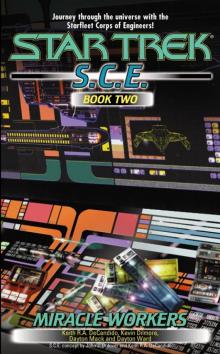 Miracle Workers
Miracle Workers Articles of the Federation
Articles of the Federation Supernatural Heart of the Dragon
Supernatural Heart of the Dragon War Stories: Book Two
War Stories: Book Two The Zoo Job
The Zoo Job Under the Crimson Sun
Under the Crimson Sun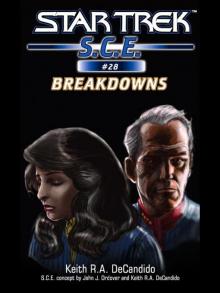 Breakdowns
Breakdowns Mermaid Precinct (ARC)
Mermaid Precinct (ARC) Supernatural 1 - Nevermore
Supernatural 1 - Nevermore STAR TREK - The Brave and the Bold Book One
STAR TREK - The Brave and the Bold Book One Four Walls
Four Walls The Klingon Art of War
The Klingon Art of War Blackout
Blackout War Stories: Book One
War Stories: Book One The Brave and the Bold Book Two
The Brave and the Bold Book Two Honor Bound
Honor Bound Sleepy Hollow: Children of the Revolution
Sleepy Hollow: Children of the Revolution Worlds of Star Trek Deep Space Nine® Volume Three
Worlds of Star Trek Deep Space Nine® Volume Three Star Trek: TNG: Enterprises of Great Pitch and Moment
Star Trek: TNG: Enterprises of Great Pitch and Moment Genesis
Genesis Demons of Air and Darkness
Demons of Air and Darkness Star Trek - TNG - 61 - Diplomatic Implausibility
Star Trek - TNG - 61 - Diplomatic Implausibility Gryphon Precinct (Dragon Precinct)
Gryphon Precinct (Dragon Precinct) THE XANDER YEARS, Vol. 1
THE XANDER YEARS, Vol. 1 Nevermore
Nevermore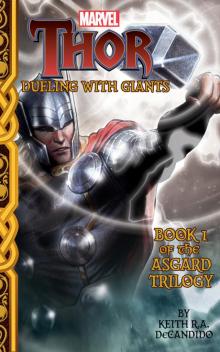 Thor
Thor The Brave And The Bold Book One
The Brave And The Bold Book One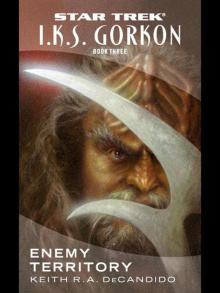 I.K.S. Gorkon Book Three
I.K.S. Gorkon Book Three STARGATE SG-1: Kali's Wrath (SG1-28)
STARGATE SG-1: Kali's Wrath (SG1-28) Bone Key
Bone Key Guilt in Innocece
Guilt in Innocece Star Trek - DS9 Relaunch 04 - Gateways - 4 of 7 - Demons Of Air And Darkness
Star Trek - DS9 Relaunch 04 - Gateways - 4 of 7 - Demons Of Air And Darkness The Art of the Impossible
The Art of the Impossible I.K.S. Gorkon Book One: A Good Day to Die
I.K.S. Gorkon Book One: A Good Day to Die Under the Crimson Sun (the abyssal plague)
Under the Crimson Sun (the abyssal plague)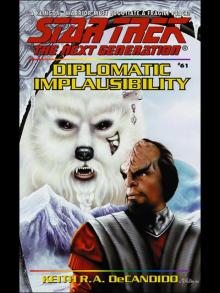 DIPLOMATIC IMPLAUSIBILITY
DIPLOMATIC IMPLAUSIBILITY Tales from the Captain's Table
Tales from the Captain's Table A Burning House
A Burning House Cycle of Hatred (world of warcraft)
Cycle of Hatred (world of warcraft)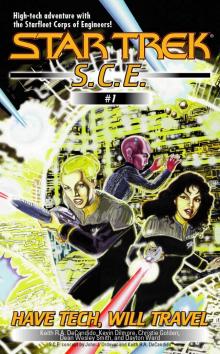 Have Tech, Will Travel
Have Tech, Will Travel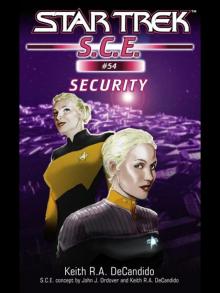 Security
Security